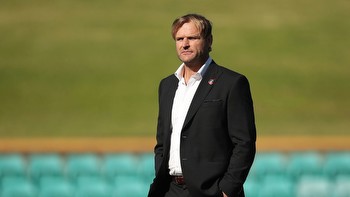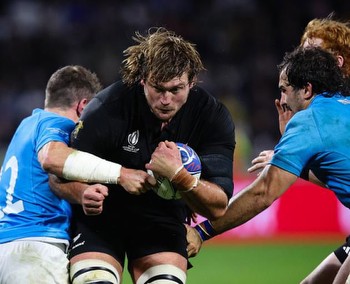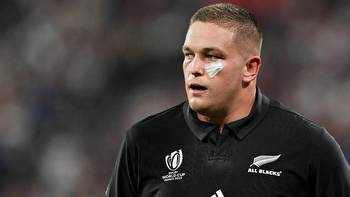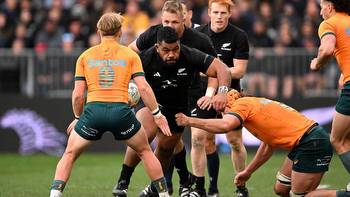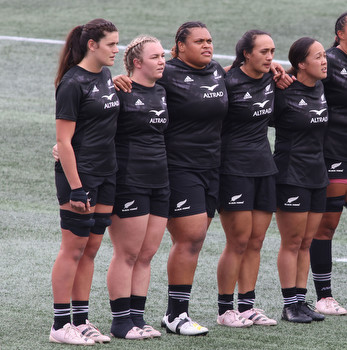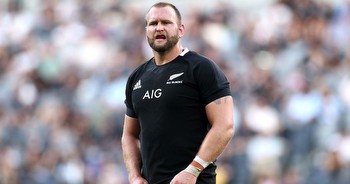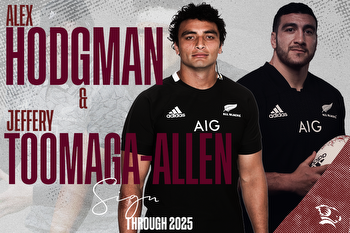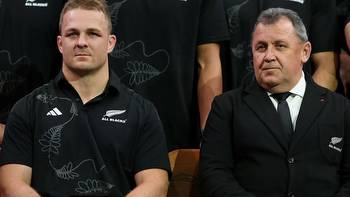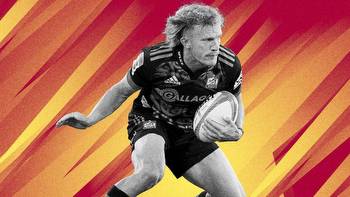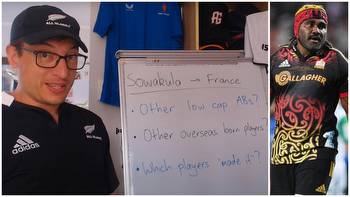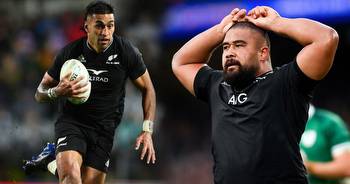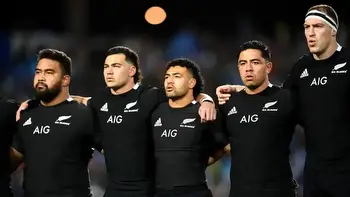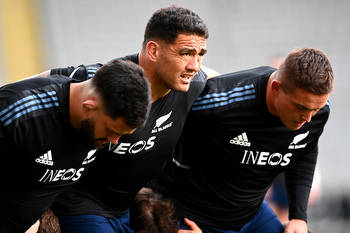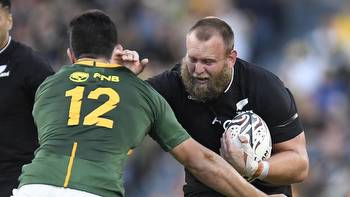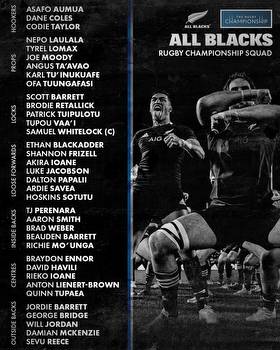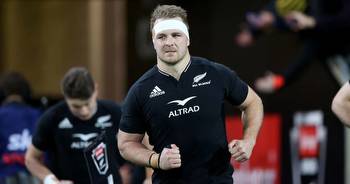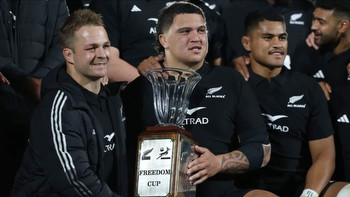All Blacks prop Karl Tu'inukuafe: 'I am the guy that is trying to stop the fights'
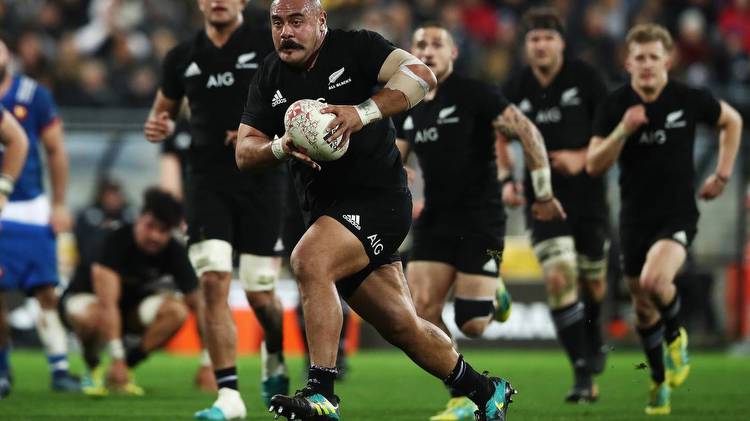
The country also farewelled a character who tussled with adversity and, despite the odds loaded against him when his weight ballooned to 175kg, not only found a way to prevent potential health scares but also earned the trust of the All Blacks' selectors and was rewarded with 27 test caps.
Let's be honest, the game needs more of these tales. Because who doesn't enjoy stories about an underdog who finds it within himself to fight out of the darkness, and claw his way to the top?
Now Tu'inukuafe has jetted off to chase a new career with the Montpellier club on the Continent at the age of 29.
If you're a front rower, that's not old. Tu'inukuafe, who made his last appearance for the All Blacks as a replacement against Ireland in Wellington on July 16, says his time here was up.
Regrets? None. He was ready to go. He didn't want to risk trying to hold on for next year's World Cup in France, having missed the cut for the 2019 global tournament because meningitis reduced his chances of impressing the selectors.
"I am definitely sad to be leaving, but I am confident in the new, younger props that are coming through,'' he says. "They are doing real well, now. I just feel like it is my time to focus on family. Last year with the long tour (to the northern hemisphere), it really took a toll on family-time and that sort of thing.
"When I am in France, the longest I will be away from home is three days.''
Tu'inukuafe's backstory never dates. When he left Wesley College, where he played for the 1st XV, he wasn't planted into one of the rugby academy hot houses that shape young men into potential Super Rugby representatives or, if they're lucky, test players.
Tu'inukuafe was married at 19, and got a job in security, mostly behind a desk but he also manned the doors. It was a working life. Then the kilos began to accumulate, and he struggled to breathe as he tied his shoelaces.
A visit to a doctor jolted him into action; unless he carved a chunk of timber off his 175kg frame, he risked suffering a heart attack.
So Tu'inukuafe got fit, made his debut for North Harbour in 2015 and thanks to team-mate and first five-eighth Daniel Halangahu, now an assistant coach at the Blues, played part of a season with French club Narbonne as injury cover.
He enjoyed that adventure, and discovered he still had much to learn about the complicated art of being a loosehead prop. Yet no-one dared believe how his luck was about to change.
Because what happened in 2018 was extraordinary. When injuries decimated the Chiefs' loosehead prop options that season, Tu'inukuafe was called in as cover and eventually made 16 appearances.
His performances were good enough for him to be picked for the All Blacks ahead of the domestic three-test series against France.
As then-All Blacks coach Sir Steve Hansen stated: "He had a few marbles roll his way''.
But Tu'inukuafe was the one who got those little glass balls in motion: hard work and determination can be valuable assets.
His test debut was memorable. Tu'inukuafe took the field as a replacement in Auckland, and in his first scrum helped bulldoze the French into conceding a penalty.
The sight of the big man with the impressive moustache shedding tears prior to the match was also beamed around the world. It's not often an All Black displays their emotions in such a manner, but Tu'inukuafe, who has Tongan heritage, regrets nothing.
"I couldn't hold anything back … I never thought I would bring my name into the spotlight of being an All Black, just making my family proud.
"I got emotional because both of my grandparents were not here to see it.''
Later in 2018 he was nominated for World Rugby's breakthrough player of the year award, missing out on the top honour to South Africa's Aphiwe Dyantyi.
Tu'inukuafe never got his jollies by trying to be a bully on the field. With his massive build he could have intimidated opponents with a foul-mouthed tirade, a death-stare or a subtle jab with the point of his elbow or fist.
The argy-bargy doesn't appeal: "I am a pretty relaxed guy. I don't fall in (to the trap) of trying to get all hyped-up by guys trying to push and shove, it doesn't really affect me.
"I don't try to be something that I'm not. Most of the time I am the guy that is trying to stop the fights. No-one really ever gave me problems. If they wanted to, I wouldn't do anything. But I found everyone was pretty nice to me.''
When deciding whether to sign the three-year deal with Montpellier, Tu'inukuafe reflected on the back injury that bothered him for about 18 months before he had surgery in December.
He had to take up to 6 pills a day to help manage the pain, and while going through the recovery process ahead of the Super Rugby season for the Blues, he decided he needed to make a big call.
The disappointment of missing the 2019 World Cup squad played a part in that.
"That was pretty gutting for me. If something happened next year, and I didn't make the World Cup team again I would be kicking myself that I didn't take my chances with what options there were overseas.
"So I talked to my wife, and we thought it was the right decision.''
The call to All Blacks coach Ian Foster, to let him know his career was over, should have been the end of their association. But it wasn't. Another surprise was in store.
"I didn't realise he wanted me to come back in,'' Tu'inukuafe said on the subject of being named in the squad to play Ireland in July.
It was a long goodbye. Tu'inukuafe thought his appearance as a replacement in Auckland really was the end. An injury to Aidan Ross ahead of the decider in Wellington, however, meant he was again required to sit on the bench despite being bothered by a knee issue that flared-up during the Super Rugby playoffs.
"But we also called in (Ethan) de Groot because my knee was playing up and I told them I didn't think I could play.
"But because de Groot only got called the day before the third game they were like 'oh, well, he doesn't know any of the moves, so if you could play the 5 or 10 minutes we would really appreciate it'.''
And that really was it. Tu'inukuafe’s career in black was finished.

